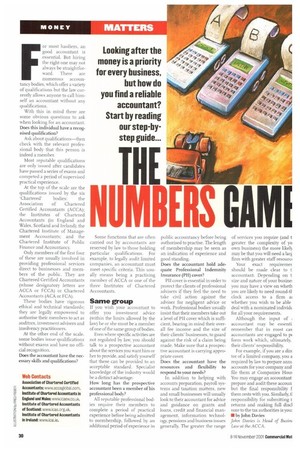ERS GAM!
Page 30

If you've noticed an error in this article please click here to report it so we can fix it.
Looking after the money is a priority for every business, but how do you find a reliable accountant? Start by reading our step-bystep guide...
For most hauliers. an good accountant is essential. But hiring the right one may not always be straightforward. There are numerous accountancy bodies, which offer a variety of qualifications but the law currently allows anyone to call himself an accountant without any qualifications.
With this in mind there are some obvious questions to ask when looking for an accountant. Does this individual have a recognised qualification?
Ask about qualifications—then check with the relevant professional body that this person is indeed a member.
Most reputable qualifications are only issued after candidates have passed a series of exams and competed a period of supervised practical experience.
At the top of the scale are the qualifications issued by the six 'Chartered bodies: the Association of Chartered Certified Accountants (ACCA); the Institutes of Chartered Accountants (in England and Wales, Scotland and Ireland); the Chartered Institute of Management Accountants; and the Chartered Institute of Public Finance and Accountancy.
Only members of the first four of these are usually involved in providing professional services direct to businesses and members of the public. They are Chartered Certified Accountants (whose designatory letters are ACCA or FCCA) or Chartered Accountants (ACA or FCA).
These bodies have rigorous ethical and technical standards; they are legally empowered to authorise their members to act as auditors, investment advisers and insolvency practitioners.
At the other end of the scale. some bodies issue qualifications without exams and have no official recognition.
Does the accountant have the necessary skills and qualifications? Web Contacts Some functions that are often carried out by accountants are reserved by law to those holding particular qualifications. For example, to legally audit limited companies, an accountant must meet specific criteria. This usually means being a practising member of ACCA or one of the three Institutes of Chartered Accountants.
Same group
If you wish your accountant to offer you investment advice (within the limits allowed by the law) he or she must be a member of one of the same group of bodies.
Even where specific activities are not regulated by law, you should talk to a prospective accountant about the services you want him or her to provide, and satisfy yourself that these can be provided to an acceptable standard. Specialist knowledge of the industry would be a distinct advantage.
How long has the prospective accountant been a member of his professional body?
All reputable professional bodies require their members to complete a period of practical experience before being admitted to membership, followed by an additional period of experience in public accountancy before being authorised to practise. The length of membership may be seen as an indication of experience and good standing.
Does the accountant hold adequate Professional Indemnity Insurance (PII) cover?
Pll cover is essential in order to protect the clients of professional advisers if they feel the need to take civil action against the adviser for negligent advice or work. Professional bodies usually insist that their members take out a level of PII cover which is sufficient, bearing in mind their overall fee income and the size of their clients' businesses, to guard against the risk of a claim being made. Make sure that a prospective accountant is carrying appropriate cover.
Does the accountant have the resources and flexibility to respond to your needs?
In addition to helping with accounts preparation, payroll systems and taxation matters, new and small businesses will usually look to their accountant for advice and guidance on grants and loans, credit and financial management, information technology, pensions and business issues generally The greater the range of services you require (and t greater the complexity of yo own business) the more likely may be that you will need a lag firm with greater staff resourci Your exact requiremer should be made clear to t accountant. Depending on t size and nature of your bu sine: you may have a view on wheth you are likely to need round-t1 clock access to a firm ai whether you wish to be able deal with a nominated individt for all your requirements.
Although the input of . accountant may be essenti remember that in most cas accountants are engaged to pc form work which, ultimately, their clients' responsibility.
For example, if you are a din tor of a limited company, you a required by law to prepare annt
accounts for your company and file them at Companies HOUE
You may engage an accountant prepare and audit these accoun but the final responsibility f them rests with you. Similarly, tl responsibility for submitting t returns and making full disci sure to the tax authorities is you: • by John Davies
John Davies is Head of Busin4 Law at the ACCA.












































































































































